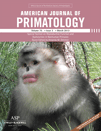
AMERICAN JOURNAL OF PRIMATOLOGY
Scope & Guideline
Illuminating the Path of Primate Knowledge
Introduction
Aims and Scopes
- Primate Behavior and Ecology:
Research on the social structures, behavioral patterns, and ecological interactions of primates in both wild and captive settings, providing insights into their adaptations and survival strategies. - Conservation and Management:
Studies focusing on conservation strategies, habitat preservation, and management practices aimed at protecting endangered primate species and their ecosystems. - Health and Welfare:
Investigations into the health, welfare, and stress responses of primates, particularly in captive settings, to improve care practices and inform ethical standards. - Cognitive and Emotional Research:
Exploration of cognitive abilities, emotional responses, and social dynamics in primates, contributing to the understanding of their mental processes and social interactions. - Genetics and Evolution:
Research on the genetic diversity, evolutionary history, and phylogenetics of primate species, which helps in understanding their adaptive strategies and evolutionary relationships. - Anthropogenic Impacts:
Examinations of how human activity affects primate behavior, health, and habitats, addressing issues such as habitat loss, climate change, and disease transmission.
Trending and Emerging
- Conservation Genetics:
An increasing number of studies utilize genetic techniques to inform conservation strategies, emphasizing the importance of genetic diversity in population management and species survival. - Technological Innovations in Research:
The application of advanced technologies such as remote sensing, bioacoustic monitoring, and machine learning to study primate behavior and ecology is on the rise, enhancing data collection and analysis. - Impact of Climate Change:
There is a growing focus on how climate change affects primate habitats, behavior, and health, reflecting broader environmental concerns and the need for adaptive management strategies. - One Health Approach:
Research integrating human, animal, and environmental health perspectives is gaining traction, highlighting the interconnectedness of primate health and human activities. - Social Networks and Dynamics:
Emerging studies on social network analysis are providing deeper insights into the complex social structures and dynamics within primate groups, enhancing understanding of their social behavior.
Declining or Waning
- Historical and Cultural Studies:
Research centered on the historical and cultural significance of primates or primatology itself has seen a decrease, as the journal shifts towards more empirical and data-driven studies. - Traditional Morphological Studies:
There has been a noticeable reduction in publications focused solely on morphological analyses without ecological or behavioral context, as the field increasingly emphasizes integrative approaches. - Basic Taxonomic Research:
While taxonomic studies remain important, there is a waning interest in purely descriptive works that do not contribute directly to conservation or behavioral understanding. - Animal Behavior Under Laboratory Conditions:
Research focusing on animal behavior in controlled laboratory settings has diminished, likely due to a growing emphasis on naturalistic and ecological studies.
Similar Journals
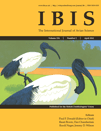
IBIS
Uncovering the secrets of ecology and evolution.IBIS, published by WILEY, stands as a prestigious journal in the field of animal science, zoology, and ecology since its inception in 1859. With a focus on innovative research that informs the scientific community on ecological dynamics, behavioral studies, and conservation strategies, IBIS fills a critical niche for researchers, professionals, and students alike. The journal is recognized for its robust impact factor and commands a Q1 ranking in three key categories as of 2023, demonstrating its influence and reach within the global academic landscape, particularly in Animal Science, Ecology, Evolution, Behavior and Systematics, and Nature and Landscape Conservation. Although not an open-access publication, its rigorous peer-review process ensures high-quality contributions that advance knowledge in these vital areas. Through interdisciplinary collaboration and comprehensive coverage of cutting-edge topics, IBIS remains an essential resource for those striving to understand and protect our natural world.
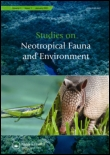
STUDIES ON NEOTROPICAL FAUNA AND ENVIRONMENT
Advancing Knowledge on Fauna and Environmental DynamicsSTUDIES ON NEOTROPICAL FAUNA AND ENVIRONMENT is a distinguished academic journal published by Taylor & Francis Ltd, dedicated to advancing the fields of Animal Science, Zoology, and Ecology. With an ISSN of 0165-0521 and an E-ISSN of 1744-5140, this journal has been a significant outlet for scholarly research since its inception in 1976, continuing to provide critical insights into neotropical biodiversity and the environmental intricacies of this rich ecological region through 2024. Recognized in the Q3 category for both Animal Science and Ecology, the journal ranks at #232/490 in Animal Science and Zoology and #402/721 in Ecology, marking it as a valuable resource for researchers, professionals, and students interested in ecological and zoological studies. By offering a platform for innovative research and comprehensive reviews, the journal aims to bridge the gap between theory and practical application, facilitating a deeper understanding of the unique challenges and conservation strategies relevant to neotropical ecosystems. Although not an open-access journal, it plays a crucial role in fostering academic discourse and knowledge dissemination in its field, ensuring that critical advancements in understanding neotropical fauna and environmental dynamics reach a diverse and engaged audience.
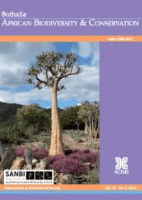
BOTHALIA
Empowering ecological understanding since 1978.BOTHALIA is a prominent open-access journal dedicated to advancing the fields of Ecology, Evolution, Behavior, and Systematics, as well as Plant Science. Published by the South African National Biodiversity Institute (SANBI), this journal has been disseminating valuable research since 1978 and has embraced open access since 2014 to enhance the visibility and accessibility of scientific knowledge. With an ISSN of 0006-8241 and E-ISSN of 2311-9284, BOTHALIA plays a pivotal role in promoting biodiversity research in South Africa and beyond. In the recent Scopus rankings, it has been positioned at Q4 in both relevant categories, highlighting its contributions within the broader scientific community, despite being in its growing phase amidst competitive rankings. The journal aims to publish high-quality articles that address critical issues in biodiversity and ecological sciences, making it an essential resource for researchers, professionals, and students committed to understanding and managing our planet's biological heritage.
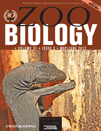
ZOO BIOLOGY
Fostering a deeper understanding of animal biology and ecology.ZOO BIOLOGY, published by Wiley, serves as an essential academic journal in the fields of animal science and zoology. With a notable ISSN of 0733-3188 and an E-ISSN of 1098-2361, the journal has been a cornerstone of wildlife research and conservation since its inception in 1982. Spanning research contributions up to 2024, ZOO BIOLOGY holds an impressive reputation, ranked in the Q2 category for Animal Science and Zoology and Q3 in miscellaneous Medicine, reflecting its significant influence and scholarly impact. With a Scopus rank of #188 out of 490 in Agricultural and Biological Sciences, the journal maintains a strong position in the 61st percentile, showcasing the high-quality research it publishes. Although it does not offer open access, ZOO BIOLOGY provides valuable insights and advancements in the biological sciences, making it an indispensable resource for researchers, professionals, and students dedicated to advancing zoological science and animal biology.

CONSERVATION GENETICS
Championing Genetic Diversity in Conservation EffortsCONSERVATION GENETICS is a leading journal dedicated to the study of genetic diversity and its implications for conservation biology. Published by SPRINGER in the Netherlands, it serves as a vital resource for researchers, professionals, and students interested in the intersection of genetics and environmental stewardship. With an ISSN of 1566-0621 and a focus on articles published since 1994, this journal currently holds impressive rankings, including Q2 in Ecology, Evolution, Behavior, and Systematics and Q3 in Genetics as of 2023, making it a pivotal platform in these fields. Although not an Open Access journal, it provides substantial insights into conservation strategies and genetic research, facilitating the understanding of species preservation and biodiversity. By contributing to the discourse surrounding genetic factors in conservation, CONSERVATION GENETICS underscores the importance of integrating genetic knowledge for effective management of natural resources and ecosystem sustainability. Join a community of scholars committed to advancing the science of conservation genetics through innovative research and collaborative inquiry.

JOURNAL OF CONCHOLOGY
Fostering Knowledge in ConchologyJOURNAL OF CONCHOLOGY, published by the Conchological Society of Great Britain & Ireland, is a prominent academic journal focused on the study of mollusks, specifically their taxonomy, ecology, and evolutionary biology. Through its rigorous peer-review process, it aims to provide a platform for significant research in the field, fostering deeper understanding and appreciation of these diverse organisms. Although it is not currently an Open Access journal, its publications contribute notably to the fields of Agricultural and Biological Sciences, notably in Ecology, Evolution, Behavior and Systematics and Aquatic Science, as indicated by its rankings in Scopus. The journal's archives trace comprehensive coverage from 1981 to 1990 and from 1996 to 2018. With its commitment to advancing conchological knowledge, the JOURNAL OF CONCHOLOGY serves as a crucial resource for researchers, professionals, and students invested in the biological and ecological dimensions of mollusk studies.

PRIMATES
Advancing knowledge in primatology since 1957.PRIMATES is a distinguished academic journal dedicated to advancing the field of primatology, published by SPRINGER JAPAN KK. Since its inception in 1957, the journal has served as a vital platform for researchers, professionals, and students passionate about the study of primates, their behavior, biology, and conservation. With a robust publication history extending to 2024 and a current ranking in the Q2 category of Animal Science and Zoology according to Scopus, PRIMATES promotes high-quality research that enhances our understanding of these remarkable species. The journal does not offer open access, ensuring that each article is meticulously curated for its discerning audience, who seek to stay informed of the latest findings and methodologies in primate research. The journal is based in Japan and continues to play an important role in the global scientific community, providing significant contributions to both the academic literature and conservation efforts surrounding primate species.

INTERNATIONAL JOURNAL OF PRIMATOLOGY
Exploring the Depths of Primate ScienceINTERNATIONAL JOURNAL OF PRIMATOLOGY, published by Springer, stands as a pivotal publication in the fields of Animal Science and Zoology, as well as Ecology, Evolution, Behavior, and Systematics. With an impressive impact factor that places it in the Q1 category for both disciplines, this journal facilitates the dissemination of high-quality, peer-reviewed research that spans a diverse array of topics related to primate biology and conservation. Established in 1980 and continuing through 2024, it provides a vital platform for researchers, professionals, and students alike to explore the complexities of primate behavior, ecology, and evolution. While currently not offering open access, the journal is highly respected within the academic community, reflected in its Scopus Rankings that highlight its sustained influence and contribution to the field. The journal's commitment to advancing knowledge and understanding of primate species makes it an essential resource for anyone dedicated to this important area of study.

SPIXIANA
Advancing the Frontiers of Animal ScienceSPIXIANA is a distinguished journal dedicated to the fields of animal science and zoology, published by VERLAG DR FRIEDRICH PFEIL in Germany. With the ISSN 0341-8391, it has been contributing to the scientific community since its inception, with volumes converging from 2008 to 2024. Although currently listed in the Q4 quartile of the 2023 category rankings for Animal Science and Zoology, it provides a vital platform for researchers and professionals to disseminate significant findings in the field. Despite being unindexed in open access, SPIXIANA ensures that vital research reaches its audience, enhancing academic discourse and furthering our understanding of zoological sciences. Its commitment to sharing rigorous scientific research make it an important resource for anyone passionate about animal biology and conservation.
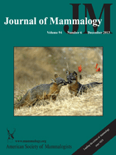
JOURNAL OF MAMMALOGY
Connecting Scholars for a Sustainable Future in MammalogyJournal of Mammalogy, published by Oxford University Press Inc, is a premier journal dedicated to the field of mammalogy, providing a key platform for researchers and professionals interested in the biology, ecology, and conservation of mammals. With a prestigious impact factor reflected in its Q1 ranking in Animal Science and Zoology, and multiple Q2 rankings in related categories such as Ecology and Genetics for 2023, this journal is recognized for its significant contribution to advancing knowledge in the discipline. The journal features rigorous peer-reviewed articles, ensuring high-quality research output valuable for students, academia, and conservation efforts alike. While not an open-access journal, it offers comprehensive subscription options for institutions and individual readers, promoting accessibility to critical findings in the realm of mammal research. Established in the earlier years of the 20th century, the Journal of Mammalogy has continuously evolved, serving as an integral resource for disseminating innovative studies and insights that drive the future of mammalian sciences.